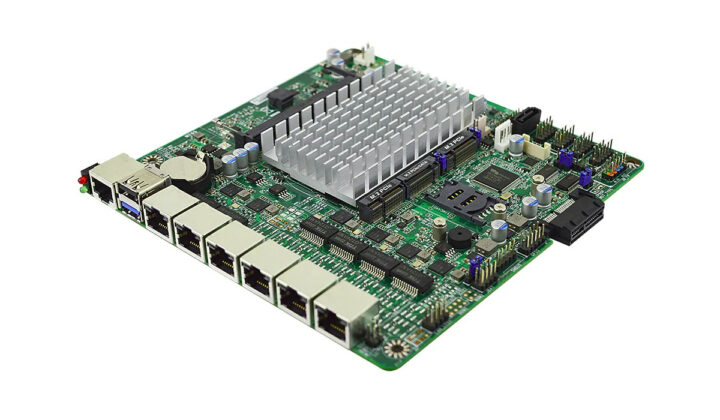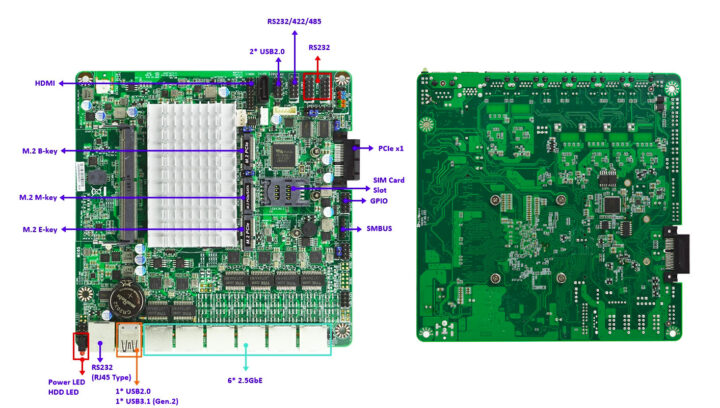Powered by an Intel Celeron J6412 quad-core Elkhart Lake processor, the Jetway MI05-0XK thin mini-ITX networking board is equipped with six 2.5GbE ports, up to 16GB RAM via a single SO-DIMM socket, as well as M.2 sockets for storage, WiFi and/or cellular connectivity, some serial ports, and an optional HDMI port for video output.
Four variants are offered: the standard MI05-00K model without eMMC flash nor TPM, the MI05-02K with a TPM 2.0 chip, the MI05-03K with a 32GB eMMC flash, and finally the MI05-07K with both the TPM 2.0 security chip and 32GB eMMC flash.
 Jetway MI05-0XK specifications:
Jetway MI05-0XK specifications:
- SoC – Intel Celeron J6412 quad-core Elkhart Lake processor @ 2.0 GHz / 2.6GHz (Burst frequency) with 1.5MB cache, 16 EU Intel UHD Graphics; 10W TDP
- System Memory – Up to 16GB DDR4-3200 via SO-DIMM socket
- Storage
- 1x SATA III (6 Gb/s) port
- 1x M.2 M-key 2242 SATA/PCIe Gen.3 x2 interface for SATA or NVMe SSD
- Optional 32GB eMMC flash
- 128 Mbit flash for AMI BIOS
- Video Output – HDMI 1.4b header up to 3840×2160 @ 30Hz to connect HDMI port if needed
- Networking – 6x 2.5GbE RJ45 ports via Intel i225-V controllers
- USB – 1x USB 3.1 Gen 2 port, 1x USB 2.0 port, 2x USB 2.0 interfaces via header
- Serial
- RS232 RJ45 port
- 1x RS232/422/485 header
- Header with 2x RS232
- Expansion slots
- 1x M.2 E-key 2230 socket with USB2.0/PCIe Gen.3 x1 interfaces
- 1x M.2 B-key 3042 socket with USB3.1 interface
- 1x PCIe x1 horizontal slot
- Misc – Power LED, HDD LED, SMBUS header, GPIO header, PS/2 header, Watchdog timer
- Power Supply – 12V DC-in; AT: Directly power on; ATX: Press Button to power on
- Dimensions – 170 x 170mm (thin mini-ITX form factor)
- Compliance – CE, FCC, RoHS, REACH
- Temperature Range – Operating: 0°C to 60°C; storage: -20°C ~ 60°C
- Humidity – 10% to 90% RH @ 40°C (non-condensing)
Jetway says the thin mini-ITX networking board support Windows 10, Windows 11, and Linux, and recommends models with the 32GB eMMC flash to boot Windows 10 for some reasons… Looking into the datasheet, we find a longer list of operating systems, even adding some BSD distributions with Win10 64-bit, Win 10 IoT Enterprise 64-bit LTSC 2019, CentOS (Version 9), Debian (Version 11.3), Fedora LXDE, Workstation, or Server (Version 36.1.5), OpenSUSE (Version 15.4), Ubuntu 22.04 Desktop/Server, pfSense (Version 2.6.0), TrueNAS (FreeNAS) (Version 13.0), RedHat Enterprise (Version 9.0), and OPNSense (Version 22.1.2).
It’s not the first time we write about a thin mini-ITX motherboard for networking applications, and the BCM Advanced Research MX6412J is also based on an Intel Celeron J6412, but only offers two Gigabit Ethernet ports plus two 2.5GbE ports, instead of the six 2.5GbE ports on the Jetway board. On the plus side, it comes with two SO-DIMM sockets for up to 32GB RAM, instead of just 16GB for the MI05-0XK board.
The Jetway MI05-0XK series motherboards are available now, and the Jetway MI05-00K model can be purchased for $299.95 on the MITXPC store based in the US. Further information may also be found on the product page.
Via LinuxGizmos

Jean-Luc started CNX Software in 2010 as a part-time endeavor, before quitting his job as a software engineering manager, and starting to write daily news, and reviews full time later in 2011.
Support CNX Software! Donate via cryptocurrencies, become a Patron on Patreon, or purchase goods on Amazon or Aliexpress






Why would anyone boot a network appliance to Windows???
Here we go again…
People have creative uses and stipluated compatibility requirements all the time.
A more obvious question: Why would a vendor ship hardware without device drivers for all major OS, including Linux and Windows
Very nice for firewalls, routers and load balancer!
I miss CoreBoot. Otherwise interesting board.
Protectli offers CoreBoot.
It would be a great mobo for network apps if it would have a quad-line PCI express socket instead of a single-line one to be able to connect a 10GBE SFP+ board. Also, two SODIMMs for memory bandwidth would be nice.
I know, there is no perfection in this world.
That’s exactly where a PCIe bridge would be useful: such SoCs have few lanes and vendors are constrained to compromise. With a bridge they could add lanes, knowing that the bandwidth will be shared, but at least it becomes easy to let the final customer understand that the PCIe connector’s bandwidth is shared with the last 4 ports for example. This could even allow to have two M2 slots. I know such chips are not cheap, but they offer lots of possibilities for interesting SoCs like this one with limited connectivtiy.
> such SoCs have few lanes
Eight Gen3 lanes to be precise. While 6 PCIe attached NICs (Gen2 x1) and 4 lanes in M.2 and PCIe slots add up to a lane count of 10.
Indeed, that precisely shows how the PCIe BW is wasted. One lane per 2.5G NIC is a lot. I don’t know if there are dual- or quad- 2.5G controllers, but for the 1G era these used to save a lot of lanes. Even having dual-2.5G per single lane would save 3 lanes.
Well, since 10 lanes vs. 8 lanes I would believe there’s a PCIe switch somewhere (unfortunately pictures too low-res/blurry). Maybe even a rather inexpensive Gen2 switch, turning incoming x4 into 8 x x1.
Gen2 x4 = 32 Gbit/sec, 6 x 2.5GbE = 15 Gbit/sec. At least ‘on paper’ it could match though no idea how such a switch affects latency.
Well, the NVME slot is Pcie 3.0 x2, which has a transfer rate of up to 2GB/s; whereas, 10gbe only has a maximum transfer of 1.25GB/s… Therefore, you should be able to throw in one of those 10gbe nvme sticks to add 10gbe for a router, but to me, the question would be whether or not the Celeron J6412 is fast enough to push it at full speed?
> the NVME slot is Pcie 3.0 x2
And affordable PCIe attached 10GbE NICs are usually Gen2 x4 and as such a Gen2 x2 link will be established in the M.2 slot.
You could build your own but costly. Start with a Ibase MBB-1000
Embedded Computing
MBB-100012th Gen Intel® Core™ i9/i7/i5/i3 / Pentium® / Celeron® with Intel® R680E/ Q670E PCH
But does it support full wirespeed switching on all ports concurrently?
What case would you put this in for the smallest footprint?
The key is to search for “thin mini-ITX enclosure”.
Something like the SilverStone PT13B-120 might work: https://amzn.to/3TdPZPL
I am wondering if anyone knows/can recommend an mITX board or even better a fanless appliance which apart from 1GbE or 2.5GbE ports would have an IPMI interface
Look at what SuperMicro offers. My home NFS server was made 12 years ago from one of their boards (x7spa-hf) which does have IPMI and is in mini-ITX format. Most likely by now they’ve evolved the specs and have something comparable to propose.
Asides SuperMicro you’ll find such stuff also from ASUS or ASRock Rack. Compared to SuperMicro often they have a more recent ASpeed BMC (the ARM thingy that does provide this insane/insecure mess called IPMI) which is also good for power consumption.